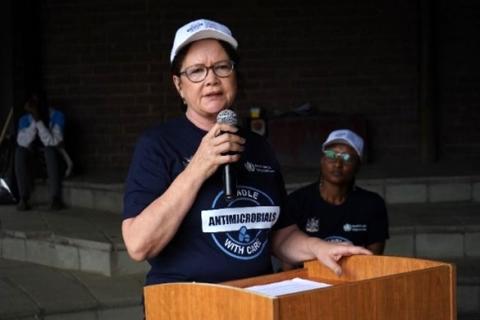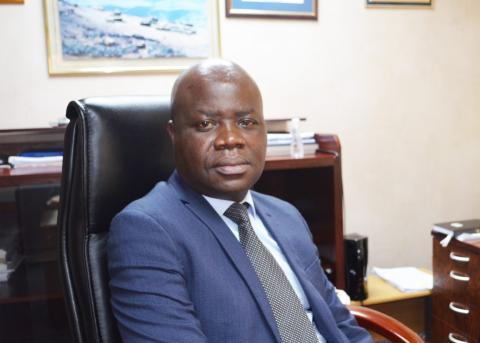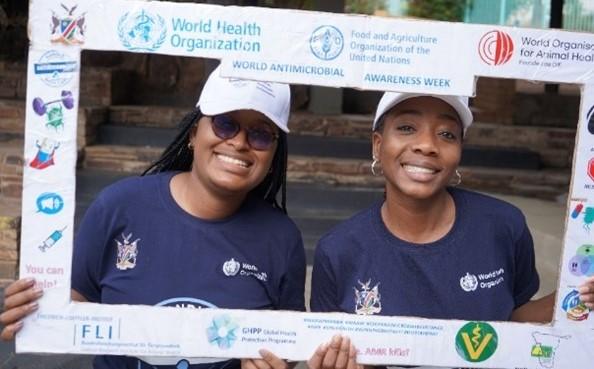Antimicrobial resistance (AMR) is one of the top global public health and development threats. In Namibia in 2019, 1 900 deaths were associated with AMR.
AMR is a threat to health security across the country and region and a range of interventions are necessary to protect the population’s health and ensure good progress towards universal health coverage.
The Government of Namibia is working on setting up a national multisectoral AMR governance process to guide, oversee, and monitor AMR-related activities in all sectors and ensure comprehensive implementation of a national action plan on AMR.
The Government of Namibia, with support from WHO through the UHC Partnership, is working across ministries and agencies to provide a comprehensive response including improving stewardship of antibiotics, strengthening surveillance, engaging communities, and conducting multi-sector strategic planning.
“The patient completed the course, stabilized, and was discharged from the intensive care unit to a general ward. Unfortunately, due to various complicated comorbidities, the patient eventually passed away”.

“Today, we find ourselves at a critical juncture in the battle against AMR. As our societies advance, so too do the microbial adversaries we face. Infections that were once treatable now pose life-threatening challenges. The steps we take today to address AMR in the country will resonate far and echo in our healthcare systems, ripple through our communities, and reach the hearts of those whose lives we touch.”

"We all have a role in containing this global threat by improving our health-seeking behavior, seeking professional advice in the event of illness, and ensuring that any prescribed treatment courses are completed. Let us seize this opportunity during World Antimicrobial Resistance Awareness Week to reaffirm our commitment to addressing AMR together.”
“The training was enlightening. We learned how to use the WHONET software and how to upload data on the GLASS platform. It was such as an achievement for us as a country, to be able to create Research Information Systems (RIS) and sample files that are needed for GLASS.”

“AMR is extremely serious. If left unchecked it means we are heading to a world where medical treatment of routine ailments or operations is life threatening and a greater number of people might stop responding to drugs. It challenges all our efforts to strengthen health systems and achieve universal health coverage. WHO commends the Namibian Government for the strategic and multiple approaches taken through collaboration between sectors and work across the region to raise awareness among the public.”
THE LONG READ
In June 2024, a 66-year-old woman was admitted to the Medical Intensive Care Unit at Intermediate Hospital Katutura in Windhoek, Namibia. She was diagnosed with pneumonia, and tests showed that the organism responsible for her severe illness was resistant to all antibiotics except tigecycline. At the hospital, the pharmacy department had to obtain a compassionate clearance permit to procure and import tigecycline for the patient.
“The patient completed the course, stabilized, and was discharged from the intensive care unit to a general ward. Unfortunately, due to various complicated comorbidities, the patient eventually passed away”, said Ms Taimi Ipinge, a Chief Pharmacist at Intermediate Hospital Katutura.
Tragically, this type of resistance to antibiotics is all too common in Namibia, as with elsewhere in the world. Antimicrobial resistance (AMR) occurs when bacteria, viruses, fungi, and parasites change over time and no longer respond to medicines, making infections harder to treat and increasing the risk of disease spread, severe illness, and death. As a result, the medicines become ineffective and infections persist in the body, increasing the risk of spreading to others. Antimicrobial resistance is one of the top global public health and development threats. It is estimated that bacterial AMR was directly responsible for 1.27 million global deaths in 2019 and contributed to 4.95 million deaths.
In 2019, Namibia recorded 451 deaths attributable to AMR and 1 900 deaths were associated with AMR. Five resistant pathogens are particularly significant in Namibia (Klebsiella pneumoniae, Staphylococcus aureus, Streptococcus pneumoniae, Escherichia coli, and Mycobacterium tuberculosis) and commonly cause lower respiratory infections, infections in the thorax, tuberculosis, bloodstream infections, peritoneal and intra-abdominal infections, and meningitis, as well as other bacterial central nervous system infections.
Acting to stop AMR
The Government of Namibia is responding to the threat of AMR by engaging multiple Government ministries and agencies. It recognizes that AMR is a threat to health security across the country and region and that a range of health system interventions are necessary to protect the population’s health and ensure good progress towards universal health coverage (UHC).
“Today, we find ourselves at a critical juncture in the battle against AMR. As our societies advance, so too do the microbial adversaries we face. Infections that were once treatable now pose life-threatening challenges. The steps we take today to address AMR in the country will resonate far and echo in our healthcare systems, ripple through our communities, and reach the hearts of those whose lives we touch,” said Mr Ben Nangombe, Executive Director of the Ministry of Health and Social Services (MoHSS).

In May 2017, the Government of Namibia began work on developing its National AMR Action Plan in compliance with the Global Action Plan to address AMR. The Government launched the AMR National Action Plan in 2020 and established the National AMR Technical Working Group in 2021.
The MoHSS, with support from WHO through the UHC Partnership and other partners, then began to implement various activities in line with the plan’s strategic pillars. The UHC Partnership operates in over 125 countries, representing over 3 billion people. It is supported and funded by Belgium, Canada, the European Union, France, Germany, Ireland, Luxembourg, Japan, the United Kingdom of Great Britain and Northern Ireland, and WHO.
Improving stewardship of antibiotics
The misuse and overuse of antimicrobials in humans, animals and plants are the main drivers in developing drug-resistant pathogens. In Namibia, the Government saw that the numbers of antibiotic prescriptions were rising, and reports from the Namibia Institute of Pathology showed resistance patterns emerging alongside irrational antibiotic prescribing.
With support from WHO, the Government is responding by setting up a national multi-sectoral AMR governance mechanism to guide, oversee, coordinate, and monitor AMR-related activities in all sectors and to ensure systematic and comprehensive implementation of Namibia’s National Action Plan on AMR. Capacity building workshop for multisectoral coordination on AMR took place in October 2024 as part of this implementation.
Communication and raising awareness
In November 2021 WHO, through the UHC Partnership, supported the Government of Namibia to commemorate its first World Antimicrobial Awareness Week (WAAW). In 2023, MoHSS in collaboration with AMR quadripartite organizations in Namibia commemorated the week under the theme of ‘Preventing antimicrobial resistance together’ with the slogan ‘Antimicrobials: handle with care’. The event brought together all three ministries that play a role in curbing antimicrobial resistance: the MoHSS, the Ministry of Agriculture, Water and Land Reform, and the Ministry of Environment, Forestry and Tourism.

"We all have a role in containing this global threat by improving our health-seeking behavior, seeking professional advice in the event of illness, and ensuring that any prescribed treatment courses are completed. Let us seize this opportunity during World Antimicrobial Resistance Awareness Week to reaffirm our commitment to addressing AMR together,” said Ms Aina Erastus, representing the Officer-in-Charge of the WHO Country Office in Namibia.

Activities that took place during the week included media outreach through radio and television to communicate the importance of treating antimicrobials with care and to promote the One Health concept to the national population. One Health recognizes that the health of humans, domestic and wild animals, plants and the wider environment are closely linked and inter-dependent, and this approach brings together stakeholders from relevant sectors to communicate and work together to tackle AMR.
An organized walk with senior management and delegates from the three ministries, One Health partners, private hospital staff, and schoolchildren also helped to raise awareness of AMR. In addition, a community sensitization initiative targeted a densely populated township in Windhoek to emphasize the roles that households and communities play in combatting AMR.

Infection prevention and control
In November 2023, the Government of Namibia launched its infection prevention and control action plan and national guidelines. WHO provided support to a range of activities including distribution of information, education and communication materials around infection prevention and control, regional orientation on quality standards, in-service training of focal points, and training on water, sanitation, and hygiene for hospital quality improvement plans. In 2024, WHO supported the Ministry of Health and Social Services to conduct an infection prevention and control case study. The aim of this study is to understand the country’s progress so far, to analyse the role of WHO's Health Emergencies infection prevention and control, and to assess the country’s current public health emergency and response system and sustainability going forward.
Strengthening surveillance
In October 2023, WHO supported the Government of Namibia to host a Global AMR/Use Surveillance System 2.0 (GLASS2.0) and WHONET training to support Member States to establish and improve national surveillance systems for AMR. This includes training on how to generate, collect, report, and use high-quality data to inform decisions at the national, regional, and international levels. Staff from the WHO Regional Office for Africa and WHO Headquarters provided on-site support to 12 African countries. As a result of this capacity-building exercise, Namibia reached a significant milestone for the first data submission to GLASS in December 2023.
“The training was enlightening. We learned how to use the WHONET software and how to upload data on the GLASS platform. It was such as an achievement for us as a country, to be able to create Resistant-Intermediate-Sensititive and sample files that are needed for GLASS,” said Ms Healia Ndishishi, a Medical Laboratory Scientist and Namibia Institute of Pathology AMR Focal Person.
Maintaining momentum with strategy and implementation
Following the WAAW, the country held its annual National AMR stakeholders meeting in April 2024 to assess progress with the implementation of the National AMR Action Plan and discuss the growing concern of AMR in Namibia. The Deputy Executive Director at MoHSS, Ms Petronella Masabane, emphasized the importance of ensuring that communities are well informed about the consequences of AMR and their role in curbing the threat, and encouraged all stakeholders to combine efforts and increase community awareness activities.

On 19 June 2024, the Government of Namibia launched the National Tripartite One Health Strategy 2024-2028 following a consultative process with experts from human, environmental, and animal health sectors as well as researchers and national policymakers. The strategy aims to support and collaborate with key stakeholders across all relevant sectors to enhance One Health coordination, collaboration, and communication.
“AMR is extremely serious. If left unchecked it means we are heading to a world where medical treatment of routine ailments or operations is life threatening and a greater number of people might stop responding to drugs. It challenges all our efforts to strengthen health systems and achieve universal health coverage. WHO commends the Namibian Government for the strategic and multiple approaches taken through collaboration between sectors and work across the region to raise awareness among the public,” said Dr Richard Banda, WHO Representative to Namibia.

Health security
Namibia’s response to antimicrobial resistance (AMR) is part of the broader effort to strengthen health security across the country. The Government of Namibia has demonstrated its commitment to health security by conducting a Joint External Evaluation (JEE) in 2016 and implementing the National Action Plan for Health Security (NAPHS) in both 2017 and 2022. Namibia has also conducted several After Action Reviews (AARs) in 2017 and 2022 and Intra-Action Reviews (IARs) in 2020, 2021, and 2022 to assess and enhance its preparedness for health threats, including AMR.
Furthermore, simulation exercises (SimEx) carried out in 2017 and 2020 have bolstered Namibia’s capacity to respond to health emergencies. These efforts align with the global commitment to enhancing health security and achieving UHC, ensuring that the country is better equipped to handle challenges like AMR.
By integrating a One Health approach and engaging key sectors, Namibia is actively working to strengthen its health systems, improve surveillance, and ensure that it is prepared to respond to emerging health threats. The launch of the National Tripartite One Health Strategy 2024-2028 further underlines the government’s commitment to safeguarding public health, both within the country and in collaboration with regional and international partners.
This article was prepared with contributions from colleagues in the WHO Regional Office for Africa AMR Unit. You can find more information by visiting the Strategic Partnership for Health Security and Emergency Preparedness (SPH) Portal: https://extranet.who.int/sph/.
